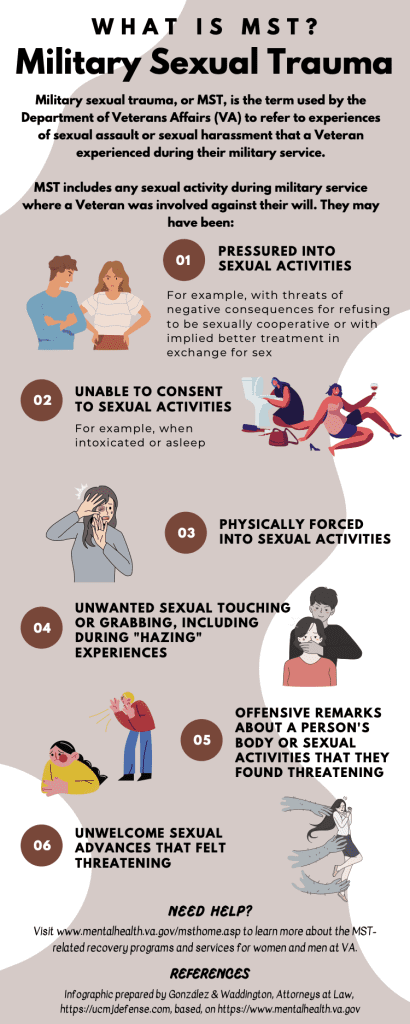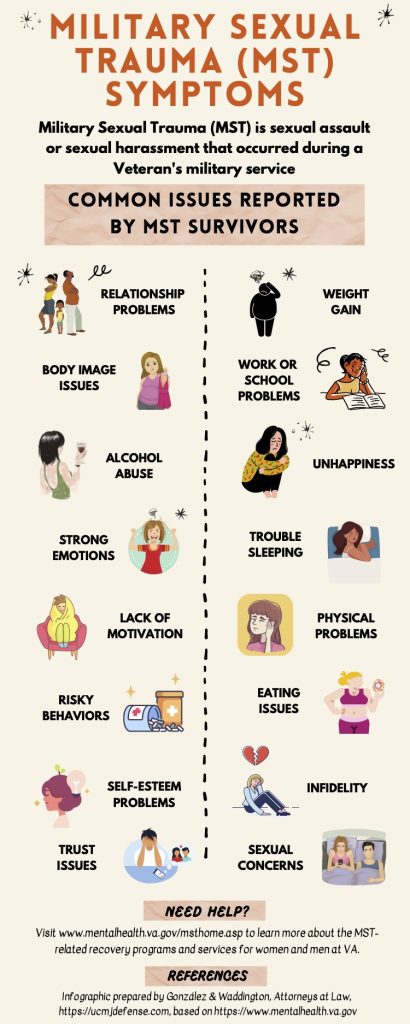Rape Victim Behavior in the Military
Victims of military sexual crimes
According to the Centers for Disease Control and Prevention (CDC), one in three women and one in four men will experience sexual violence at some point in their lives, including physical contact.
Victims of sexual assault
Regardless of age or gender, the consequences of sexual abuse go far beyond physical trauma. Victims of sexual assault usually see victimization as a traumatic event, but long after the attack, victims often experience fear responses triggered by any number of memories of sexual assault. As a result, victims of the attack usually avoid anything that reminds them of the attack (places, situations, people, etc.
Because people can suffer from PTSD after a series of horrific experiences, including fighting, assaults, or fatal accidents, they will do their best to avoid people, places, things, or situations that remind them of the attack. Many people will develop substance abuse problems or other unhealthy behaviors (such as self-harm) to cope with the intense, unpleasant emotions that result from the attack. Victims of rape are more likely to have long-term mental and physical problems.

Infographic Military Sexual Trauma – MST Symptoms VA Disability Ratings
A group of German researchers compared 27 survivors of rape during World War II with women who had suffered other types of trauma during the war to find out whether victims of rape were more likely to experience these devastating mental health problems than non-victims. A national women’s study has convincingly confirmed the mental health effects of rape.
Chronic psychopathology
Several studies have shown that victims of rape trauma have one of the highest risks of developing PTSD and related conditions. PTSD is fairly common among victims of sexual assault, with one study showing that approximately 70% of victims of sexual assault experience severe trauma, and 45% report symptoms of PTSD. Chronic psychopathology does not develop in most rape or sexual assault victims. However, these forms of trauma victimization are associated with a higher prevalence of PTSD than other types of traumatic events.
In addition, external factors such as the victim’s social support, the severity of the attack, or the relationship between the victim and the abuser can also affect the victim’s psychological state and behavior after the sexual assault. By analyzing their behavior, victims may believe that they can explain what happened or find ways to avoid similar situations, thereby avoiding future victims.
Infographic on Military Sexual Trauma MST-VA Disability for Military Sexual Assault PTSD
Inappropriate or illegal behavior among victims
It may indeed be intentional for perpetrators to induce inappropriate or illegal behavior among victims, knowing that this is an additional layer of protection for themselves if the victim reports their sexual harassment. Victims sometimes fear getting into trouble because of their “bad” or illegal behavior (minors use alcohol, drugs, lie to their parents about where they are or who they are with). As a result, they will make false statements to friends, family, and even family members.
Adults victims of sexual assault
Criminals reinforce these feelings by what they say and do with their victims. For many male victims, shame and secrecy are compounded by the fear that their sexuality might have something to do with it or that others believe that.
These reactions are common in adults victims of sexual assault. However, often adults and children react differently to rape. This connection shows how important the public response to rape is. For example, most robbery victims have no shame. Yet, the trauma of rape among women often leads to intense anger that the rape victim might direct towards herself or others perceived as unfortunate self-objects.
Sexual abuse and its aftermath
While victims may view sexual abuse and its aftermath with sadness, the feelings of abuse at other stages are not as strong, overwhelming, or destructive as they once were. Memories, nightmares, and intrusive memories are extremely common, particularly in the first few months after an attack. Memories, nightmares, debilitating fears, and other symptoms of PTSD can persist long after the physical trauma has healed. Victims often begin to develop acute symptoms after the initial shock of the attack subsides.
External adjustment
External adjustment victims may increase dependence on coping mechanisms, which may be adaptive, such as relying on support from family or friends, awareness, or self-care. Still, others may be counterproductive in the long run. Nevertheless, there are some typical behaviors that victims can exhibit and the best ways to respond if and when someone claims to have been raped or sexually assaulted. To understand the victim’s response to sexual assault, it is important to first understand the consequences of the trauma and understand the victim’s ability to remember information.
Rape Trauma Syndrome (RTS)
Rape Trauma Syndrome (RTS) is the psychological trauma experienced by rape victims, including the destruction of normal physical, emotional, cognitive, and interpersonal behaviors. RTS describes trauma symptoms, including obstacles to normal physical, emotional, cognitive, and interpersonal behavior. RTS is a group of psychological and physical symptoms and reactions that occur immediately after the rape but may also occur months or years later.

